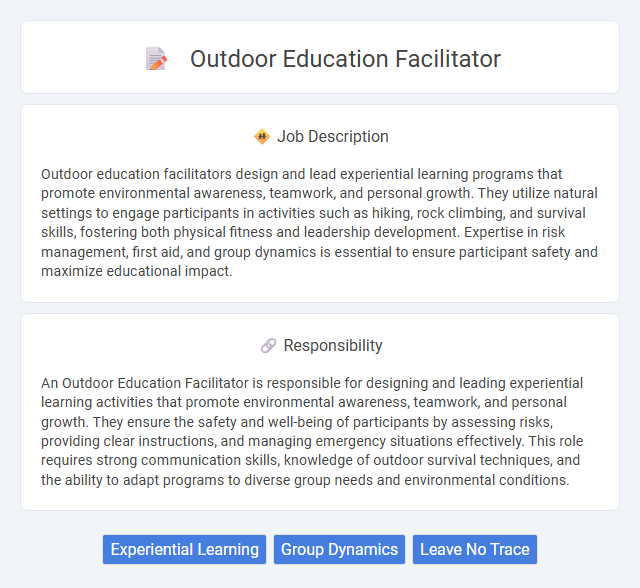
Outdoor education facilitators design and lead experiential learning programs that promote environmental awareness, teamwork, and personal growth. They utilize natural settings to engage participants in activities such as hiking, rock climbing, and survival skills, fostering both physical fitness and leadership development. Expertise in risk management, first aid, and group dynamics is essential to ensure participant safety and maximize educational impact.
Individuals with a passion for nature, strong communication skills, and the ability to adapt to varying outdoor conditions are likely suitable for an outdoor education facilitator role. Those who thrive in dynamic environments, enjoy leading group activities, and possess a high level of physical fitness may find this job a good match. Conversely, people who prefer routine indoor work or have limited patience for group management might face challenges in this position.
Qualification
Outdoor education facilitators typically require a background in environmental science, education, or related fields, along with certifications in first aid and wilderness safety. Experience in leading group activities, risk management, and strong communication skills are essential for effectively guiding participants in outdoor learning environments. Proficiency in outdoor survival techniques and knowledge of local flora and fauna enhance the facilitator's ability to deliver engaging, educational experiences.
Responsibility
An Outdoor Education Facilitator is responsible for designing and leading experiential learning activities that promote environmental awareness, teamwork, and personal growth. They ensure the safety and well-being of participants by assessing risks, providing clear instructions, and managing emergency situations effectively. This role requires strong communication skills, knowledge of outdoor survival techniques, and the ability to adapt programs to diverse group needs and environmental conditions.
Benefit
Outdoor education facilitators likely enhance participants' physical health and mental well-being by promoting active engagement in nature-based activities. They may foster essential skills such as teamwork, leadership, and problem-solving, contributing to personal growth and self-confidence. This role often provides facilitators with rewarding opportunities for professional development and a fulfilling connection to environmental stewardship.
Challenge
Outdoor education facilitators likely encounter various challenges, including managing unpredictable weather conditions and ensuring participant safety in natural environments. They probably need strong problem-solving skills to adapt activities to diverse group dynamics and skill levels. Balancing educational goals with physical and emotional challenges may require quick thinking and resilience.
Career Advancement
Outdoor education facilitators gain valuable leadership and environmental skills that enhance their career prospects in education, recreation, and conservation sectors. Progression opportunities include roles like program coordinator, outdoor school director, or environmental education specialist, each offering increased responsibility and strategic influence. Specialized certifications in wilderness first aid or adventure programming further boost advancement potential and salary growth.
Key Terms
Experiential Learning
Outdoor education facilitators specialize in designing and leading experiential learning programs that engage participants through direct interaction with natural environments. They use hands-on activities such as hiking, team-building exercises, and environmental exploration to foster personal growth, leadership skills, and ecological awareness. This role requires expertise in outdoor safety, group dynamics, and educational strategies to create impactful, immersive learning experiences.
Group Dynamics
An outdoor education facilitator expertly manages group dynamics to foster collaboration, trust, and effective communication within teams. They design and implement experiential activities that enhance problem-solving skills, leadership development, and conflict resolution in natural settings. Their role is pivotal in creating supportive environments that encourage personal growth and collective learning.
Leave No Trace
An Outdoor Education Facilitator specializes in teaching sustainable practices through Leave No Trace principles, ensuring minimal environmental impact during outdoor activities. They design and lead educational programs that emphasize conservation, wilderness ethics, and responsible recreation to promote ecological stewardship. Mastery of Leave No Trace standards enhances participants' awareness of protecting natural habitats and preserving outdoor spaces for future generations.
 kuljobs.com
kuljobs.com